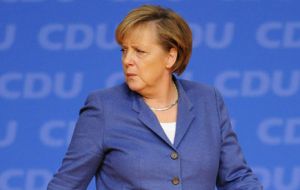MercoPress. South Atlantic News Agency
Merkel under pressure on the Euro from allies and her conservative coalition
 The EU summit will ask the Chancellor that Germany stands up to the challenges
The EU summit will ask the Chancellor that Germany stands up to the challenges Chancellor Angela Merkel tried to deflect growing international pressure on Germany to agree an increase in the Euro zone's bailout funds by saying talks were still continuing.
Amid calls to raise the size of the permanent European Stability Mechanism (ESM) ahead of an EU summit Monday, Merkel was asked by Bild am Sonntag newspaper about “rising pressure” on Germany to “massively increase” the bailout fund.
But the chancellor did not address the issue of whether Germany would back raising the ESM and instead answered a question about what impact increasing the ESM might have on the German budget this year.
“The negotiations are continuing on whether we'll pay in our contribution in one tranche or two tranches,” said Merkel, who has resisted calls for Germany to back increasing the bailout funds in part due to opposition in her centre-right coalition.
“But independent of all that, our deficit level as far as the European Stability Pact is concerned will not be increased as a result because the money won't be gone. It's only to be transferred from the federal budget to the ESM.”
Merkel is keen to avoid the EU summit being sidetracked by debate about whether extra funding should be funnelled into the Euro zone bailout funds, as the International Monetary Fund and some Euro states – including Italy and Spain -- have suggested.
A close Merkel ally in parliament, Peter Altmaier, said it made sense to first see how effective the ESM is. “It would be good if we make good use of the amounts that are now available,” Altmaier, a senior MP, told German radio.
Austrian chancellor Werner Faymann said in an interview in Der Spiegel news magazine he believed the 500-billion Euro ESM firewall may need to be raised, echoing appeals made in Berlin by IMF head Christine Lagarde and Italian premier Mario Monti.
“I wouldn't promise my parliament that 500 billion Euros will be enough,” Faymann said, adding his government was preparing to contribute to a higher firewall by taking funds from the European Financial Stability Facility (EFSF).
“This is the direction it should go -- that way we'd come up with a total of about 750 billion Euros,” he said. “Financial markets are observing us closely and measuring how strong we are by looking at the size of the firewall. If it's too low, we'll be giving the markets a reason to speculate against us.”
The German government believes that there should not be any discussions about increasing the firewall until March. Merkel believes that only the threat of a disaster may persuade her coalition to back more funds for the currency block.




Top Comments
Disclaimer & comment rulesCommenting for this story is now closed.
If you have a Facebook account, become a fan and comment on our Facebook Page!